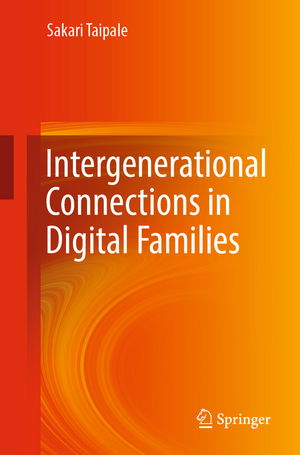Intergenerational Connections in Digital Families
Autor Sakari Taipaleen Limba Engleză Paperback – 14 feb 2019
The author focuses on three European countries: Finland, Italy and Slovenia, but also touches on other European countries and parts of the United States, revealing evidence that challenges ideas of universal adoption of information communication technology (ICT) and consistency in the social effects of such adoption in different regions and cultures. Further, the book discusses numerous other challenges and issues, such as:
• the social transformations and technological developments that have made digitalfamilies possible;
• the resulting changes in family roles, responsibilities, and practices; and
• the theoretical and conceptual implications of digital communication-technology use in families. The author illustrates how ICT can facilitate family solidarity and how it helps to provide new ways of being together, and they discuss how social media, particularly instant messaging applications, helps develop affinity between family members better than traditional one-to-one personal communication tools.
Combining highly nuanced material with fresh sociological thinking, it enhances readers’ theoretical understanding of the meaning of the ‘digital family’, making it a powerful resource for graduate and undergraduate students, as well as academics. Thanks to its structured format with easy-to-understand explanations, it appeals to practitioners and researchers alike.
Preț: 379.68 lei
Nou
Puncte Express: 570
Preț estimativ în valută:
72.66€ • 74.41$ • 60.44£
72.66€ • 74.41$ • 60.44£
Carte tipărită la comandă
Livrare economică 19 martie-02 aprilie
Preluare comenzi: 021 569.72.76
Specificații
ISBN-13: 9783030119461
ISBN-10: 3030119467
Pagini: 116
Ilustrații: IX, 137 p. 3 illus.
Dimensiuni: 155 x 235 mm
Greutate: 0.22 kg
Ediția:1st ed. 2019
Editura: Springer International Publishing
Colecția Springer
Locul publicării:Cham, Switzerland
ISBN-10: 3030119467
Pagini: 116
Ilustrații: IX, 137 p. 3 illus.
Dimensiuni: 155 x 235 mm
Greutate: 0.22 kg
Ediția:1st ed. 2019
Editura: Springer International Publishing
Colecția Springer
Locul publicării:Cham, Switzerland
Cuprins
Acknowledgments.- Introduction.- Part I: Digital Families.- What is Digital Family?.- Technological Drivers and Social Changes.- Beyond family generations.- Part II: Roles, Duties, and Practice.- Warm Experts 2.0.- Digital Housekeeping.- The Big Meaning of Small Messages.- Intergenerational Solidarity.- Part III: Implications and Conclusions.- Technologies of Re-familisation.- Toward a Positive Approach to Digital Families.- Appendix: Methods and data.
Notă biografică
Adjunct Professor Sakari Taipale has researched the social and human aspects of digital technologies extensively for 15 years. In his Academy of Finland Research Fellow project, Intergenerational Relations in Broadband Societies (iGRIB) (2013–2018), he collected extensive qualitative interview material from families in three European countries (Finland, Italy, Slovenia) and analysed varied quantitative data sets to gain a comprehensive understanding of digital technology use in European families. His involvement in other research projects like the Mature Consumer, Customer Experience and Value Creation in Digital and Physical Environments (the Finnish Funding Agency for Innovation (Tekes), 2015–2016) and the COST Action IS1311 Intergenerational Family Solidarity Across Europe (INTERFASOL) have also provided theoretical insights and empirical research findings that are presented in this book.
Textul de pe ultima copertă
This book provides a comprehensive review of how digital communication technology can help families network and communicate across generations, despite differences in family composition, residential location, cultural values and orientations. Covering the full spectrum of intergenerational relations (including child to parent, and parent to grandparent), it offers a positive view of the value of digital technology usage within families.
The author focuses on three European countries: Finland, Italy and Slovenia, but also touches on other European countries and parts of the United States, revealing evidence that challenges ideas of universal adoption of information communication technology (ICT) and consistency in the social effects of such adoption in different regions and cultures. Further, the book discusses numerous other challenges and issues, such as:
• the social transformations and technological developments that have made digitalfamilies possible;
• the resulting changes in family roles, responsibilities, and practices; and
• the theoretical and conceptual implications of digital communication-technology use in families.
The author illustrates how ICT can facilitate family solidarity and how it helps to provide new ways of being together, and they discuss how social media, particularly instant messaging applications, helps develop affinity between family members better than traditional one-to-one personal communication tools. Combining highly nuanced material with fresh sociological thinking, it enhances readers’ theoretical understanding of the meaning of the ‘digital family’, making it a powerful resource for graduate and undergraduate students, as well as academics. Thanks to its structured format with easy-to-understand explanations, it appeals to practitioners and researchers alike.
The author focuses on three European countries: Finland, Italy and Slovenia, but also touches on other European countries and parts of the United States, revealing evidence that challenges ideas of universal adoption of information communication technology (ICT) and consistency in the social effects of such adoption in different regions and cultures. Further, the book discusses numerous other challenges and issues, such as:
• the social transformations and technological developments that have made digitalfamilies possible;
• the resulting changes in family roles, responsibilities, and practices; and
• the theoretical and conceptual implications of digital communication-technology use in families.
The author illustrates how ICT can facilitate family solidarity and how it helps to provide new ways of being together, and they discuss how social media, particularly instant messaging applications, helps develop affinity between family members better than traditional one-to-one personal communication tools. Combining highly nuanced material with fresh sociological thinking, it enhances readers’ theoretical understanding of the meaning of the ‘digital family’, making it a powerful resource for graduate and undergraduate students, as well as academics. Thanks to its structured format with easy-to-understand explanations, it appeals to practitioners and researchers alike.
Caracteristici
Discusses the positive influences of digital technology on family interaction and communication Provides examples from empirical studies and is up-to-date with current social theory Engagingly written – a book for students and general readers as well as experts
